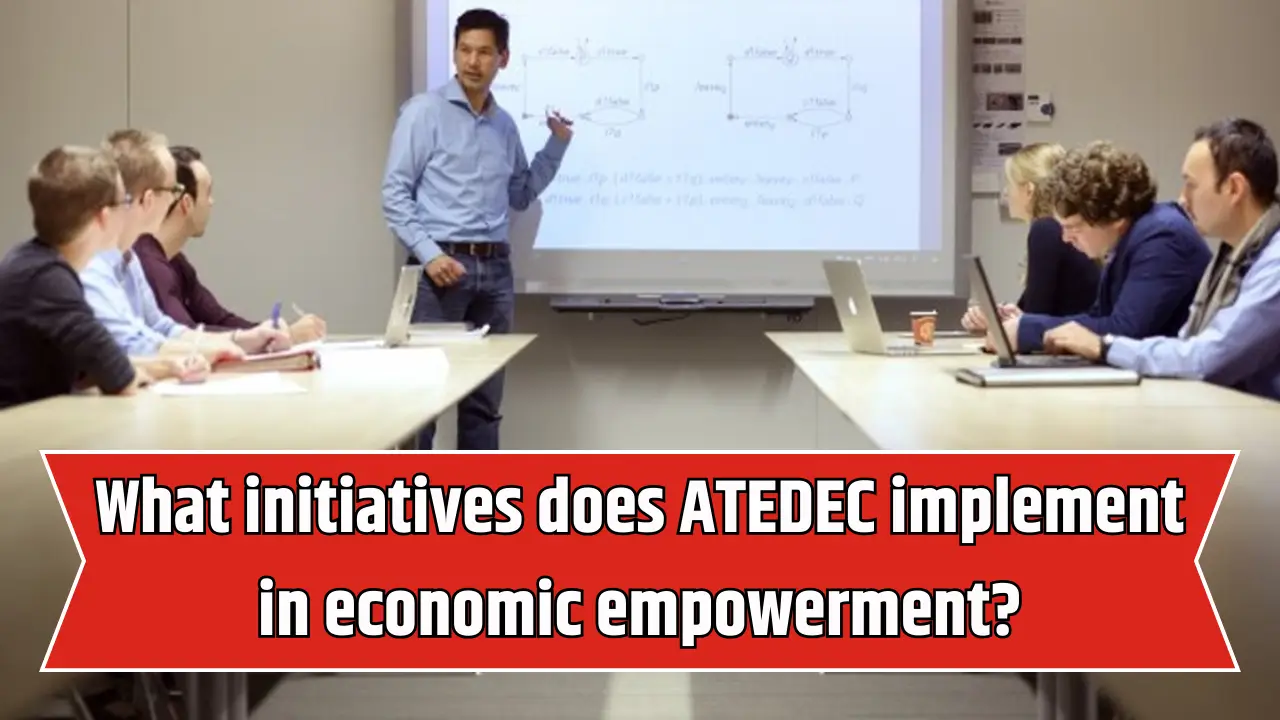ATEDEC (Action Technique pour un Developpement Communautaire) is a key non-governmental organization operating in Rwanda since 1995, focusing on sustainable development and poverty alleviation.
One of its core mandates is economic empowerment, aimed at enabling vulnerable groups, including women, youth, and displaced families, to achieve financial independence and improve their livelihoods.
By combining training, microfinance, cooperative support, and entrepreneurship development, ATEDEC empowers communities to become active participants in Rwanda’s economic growth.
This article provides a comprehensive look at ATEDEC’s economic empowerment initiatives, including their structure, main programs, impact, and recent developments in 2025.
Vision and Mission in Economic Empowerment
Vision
To create self-reliant communities by fostering economic independence through skills development, access to financial resources, and sustainable livelihood opportunities.
Mission
- To provide technical, financial, and educational support for developing community-led income-generating activities.
- To build capacities for entrepreneurship and cooperative management.
- To integrate economic empowerment with social development goals like gender equality and youth inclusion.
Core Economic Empowerment Programs by ATEDEC
1. Women Empowerment and Microfinance Initiatives
- Formation and Support of Women’s Cooperatives: ATEDEC organizes women into democratically governed cooperatives, providing startup capital and training.
- Microcredit and Savings Groups: Facilitates access to small loans and savings schemes tailored for widows, female-headed households, and vulnerable women.
- Entrepreneurship Training: Focused on developing skills such as accounting, marketing, and business planning particularly in food processing, tailoring, handicrafts, and small-scale retail.
- Trauma Counseling and Social Support: Ensures holistic support so women can overcome psychological barriers to economic participation.
2. Youth Vocational Training and Employment Promotion
- Vocational training in sectors like carpentry, mechanics, ICT, tailoring, and agriculture.
- Youth “work readiness” programs offering entrepreneurial and financial literacy.
- Internships and apprenticeships in partnership with local businesses.
- Support for youth-led startups with mentorship and access to microfinance.
3. Cooperative Development and Capacity Building
- Training cooperatives on governance, democratic leadership, financial management, and legal registration.
- Supporting cooperative ventures in agriculture, fisheries, and small-scale industry.
- Linking cooperatives to markets for better income generation.
- Facilitating official recognition and registration for cooperatives to access government and donor support.
4. Sustainable Agriculture and Food Security
- Providing seeds, tools, and training on climate-smart agricultural practices.
- Promoting farmer co-operatives for collective production and marketing.
- Linking agricultural livelihoods with nutrition and community health programs.
- Resilience-building against climate change effects for rural households.
Impact of ATEDEC’s Economic Empowerment Initiatives
| Program Area | Achievements | Impact Examples |
| Women’s Cooperatives | Established 5 women’s co-operatives in rural Nyamasheke | All cooperatives registered and making profits through food vending businesses |
| Microfinance Programs | Provided startup capital and microloans to 500+ women annually | Increased household incomes and school fee payments for children |
| Youth Vocational Training | Trained over 1,000 youth in vocational skills annually | Over 30% of graduates employed or running businesses within 6 months |
| Cooperative Capacity Building | Supported official registration and governance training for 20 cooperatives | Enhanced transparency and market access |
| Sustainable Agriculture | Distributed seeds and climate-smart tools to 800 farmers | Improved crop yields and food security |
Challenges in Economic Empowerment Efforts
- Funding Constraints: Limited financial resources restrict program expansion and scale.
- Market Access: Small producers face difficulties in accessing stable and profitable markets.
- Gender Barriers: Cultural norms can limit women’s full economic participation.
- Youth Unemployment: Despite training, job creation and employment rates require strengthening.
- Climate Vulnerability: Environmental challenges threaten livelihoods based on agriculture.
Recent Innovations and Updates in 2025
- Digital Financial Services: Introduction of mobile banking and digital platforms for microcredit disbursement and savings tracking to enhance financial inclusion.
- Climate-Smart Enterprise Support: Training cooperatives and entrepreneurs on green business practices and sustainable resource management.
- Women’s Leadership Forums: New initiatives promoting advocacy, networking, and policy engagement among women entrepreneurs.
- Youth Entrepreneurship Incubators: Establishment of hubs offering business coaching, mentorship, and seed funding for innovative youth startups.
- Private Sector Partnerships: Collaborations to provide apprenticeships, job placement, and market access for cooperative products.
- Integration with National Policies: Aligning empowerment programs with Rwanda’s Vision 2050 and SDGs to ensure sustainability and scale.
Summary Table: ATEDEC Economic Empowerment Program Framework
| Program Component | Activities | 2025 Innovations and Focus |
| Women’s Cooperatives | Cooperative formation, microcredit, training | Digital finance, leadership forums |
| Youth Vocational Training | Technical skills, internships, entrepreneurship | Start-up incubators, private sector linkages |
| Cooperative Capacity Building | Governance, registration, market linkage | Enhanced transparency, market data tools |
| Sustainable Agriculture | Seeds, climate-smart training, farmer groups | Green business models, resilience training |
Conclusion
ATEDEC’s economic empowerment initiatives represent a comprehensive and dynamic approach to alleviating poverty and fostering sustainable livelihoods in Rwanda.
By targeting women, youth, and rural farmers with skills development, financial access, and cooperative promotion, the NGO creates vital pathways for economic independence and social inclusion.
The integration of innovative digital tools, climate-conscious practices, and strengthened partnerships in 2025 positions ATEDEC to significantly scale its impact.
These efforts not only raise household incomes and improve living standards but also contribute powerfully to Rwanda’s broader goals of inclusive growth, gender equality, and environmental sustainability.
ATEDEC stands as a model for how focused, community-driven economic empowerment can transform lives and build resilient, thriving local economies for future generations.













